To gain a greater understanding of how challenges are redefining the role of innovation policy, not only in developed economies but also in middle and low-income economies, the FCI EAP Seoul Center for Finance and Innovation and the Competitiveness Unit are organizing the Innovation Policy in the Post-COVID World Webinar Series since November 2021. The objective of this series is to share knowledge that can help policy makers, practitioners, WB teams, and experts in developing economies navigate, design, and adapt innovation policies post-pandemic. The series features experts and researchers to discuss topics such as digital adoption among SMEs, entrepreneurship policy, green tech adoption, mission-oriented innovation policy, public procurement for innovation, among other related topics.
Innovation Policy in the Post-COVID World Webinar Series
March 8-9, 2023
Virtual
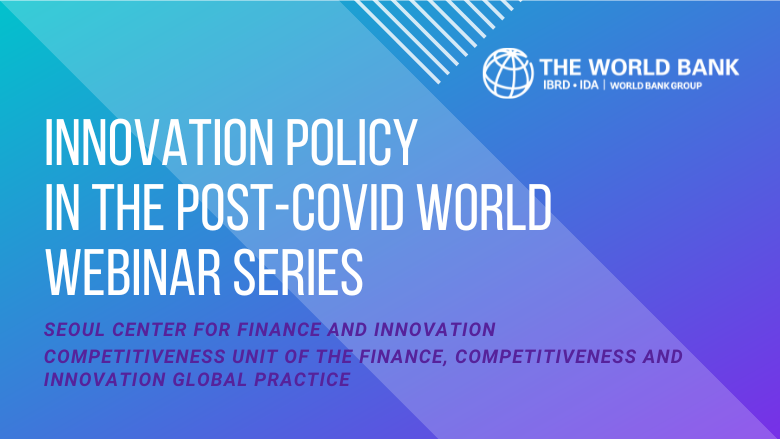
-
-
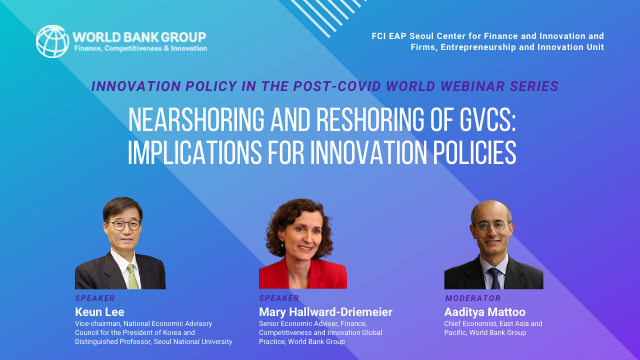
The pandemic has been a significant shock to the world economy, and this has manifested in the reconfiguration of the global supply chains. Other factors are also contributing to the changing landscape of GVCs, such as digitalization and Industry 4.0, the US-China trade dispute, and the rise in labor costs in China. The trend has implications on the geography of production, especially in emerging economies. Could developing countries stand to benefit from this rearrangement? How could innovation policies leverage windows of opportunity to attract (or attract back) much-needed GVCs investments while building local production capabilities, and higher quality jobs?
Link to recording: Innovation Policy In The Post-COVID World Webinar Series: Nearshoring And Reshoring Of GVCs - Implications For Innovation Policies
Related Readings
- At Your Service?: The Promise of Services-Led Development
- Trouble in the Making? The Future of Manufacturing-Led Development
- Changing GVC in Post-Pandemic Asia: Korea, China and Southeast Asia
- WDR 2020: Trading for Development in the Age of Global Value Chains
Presenter resources
-
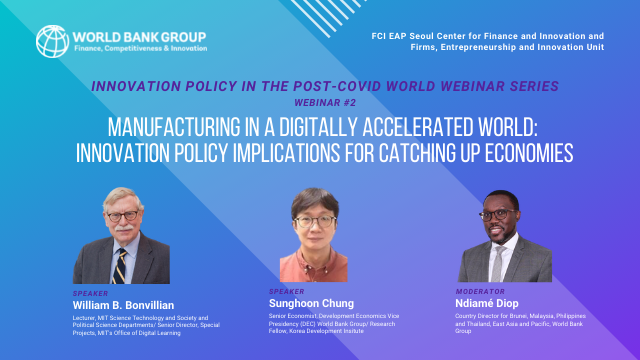
Manufacturing is witnessing a significant transformation as leading firms increasingly leverage smart and ubiquitous technologies to boost their efficiency, productivity, and accuracy. One of the primary drivers of digitalization is the enhanced capacity of manufacturers to adjust quickly to changing market conditions and increasing customization. Confronted with the disruption caused by the COVID-19 pandemic, the pace of digitalization has accelerated even further, although at a very uneven pace as there is increasing divergence between leading firms and the rest.
This webinar discusses the challenges of digitalization in manufacturing, with a special focus on the types of policies that developed economies are using to promote digitalization in manufacturing and the policy implications for catching up economies. What does ‘smart manufacturing' entail and what complementarities are required for a dynamic industrial ecosystem? What are the fundamental competencies required and what are the most effective policy interventions to help industries develop them? Can firms and industries that are still at Industry 1.0 and 2.0 leapfrog to 4.0? What experiences and evidence from industrialized economies could inform policymakers in catching up with economies?
Link to recording: Innovation Policy In The Post-Covid World Webinar Series: Manufacturing In A Digitally Accelerated World - Innovation Policy Implications For Catching Up Economies
Related Readings
- Advanced Manufacturing: The New American Innovation Policies
- How Smart Is a ‘Smart Factory’?: Drivers and Effects of Factory Smartization
- Organizing for Digitalization at the Firm Level
- Trouble in the Making? : The Future of Manufacturing-Led Development
Presenter resources
-
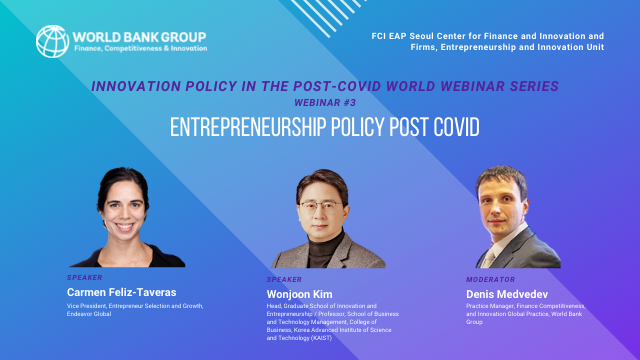
Entrepreneurial activity is an important pillar of economic growth, driving job and value creation and stimulating innovation. Entrepreneurs, investors, and governments have reacted to the pandemic differently and with varying degrees of effectiveness - few markets and sectors flourished while others suffered tremendously. This webinar discusses the challenges of designing and implementing entrepreneurship policy post-pandemic. Some of the questions to be addressed:
- Have there been structural changes in the entrepreneurial landscape due to the pandemic?
- What are the observations from developed and emerging economies?
- What is the [changing] role of public policy in supporting entrepreneurial ecosystem development?
- What has been the experience in supporting and scaling up entrepreneurship in emerging market entrepreneurship ecosystems, South Korea and globally?
Presenters share views and observations about key policy issues and responses from different markets in an attempt to draw lessons for emerging economies.
Link to recording: Innovation Policy In The Post-COVID World Webinar Series: Entrepreneurship Policy Post COVID
Related reading
- High-Growth Firms: Facts, Fiction, and Policy Options for Emerging Economies
- Innovation and Entrepreneurship: Research Report Series
- When does entrepreneurship failure help the next tech-based startup?
- Dealing with failure: Serial entrepreneurs and the costs of changing industries between ventures
- Firm performance and state innovation funding: Evidence from China’s Innofund program
- How is COVID Changing the Geography of Entrepreneurship? Evidence from the Startup Cartography Project
Presenter resources
-

The COVID-19 pandemic has triggered a renewed interest in domestically sensitive sectors and the need to access and produce specific products and technologies. While this is not something new, geopolitical uncertainty, global trade tensions, digitally-driven technology changes, signs of reshoring and reconfiguration of GVCs, and more importantly, the uncertainty caused by this and potential future pandemics, have added pressure on governments to revise policies to support and create domestic technology and production capabilities. This drive has translated into the proliferation of government instruments, such as procurement programs for innovation or standards-setting, that aim at achieving the so-called “technology sovereignty”.
These instruments and approaches are not, however, risk-free. Can these instruments result in distortions that undermine competition and trade? More importantly, can they act against the open nature of innovation and science, which requires intra and cross-border cooperation between different actors to succeed? What are the implications in terms of designing mission-oriented innovation policy?
The objective of this webinar is to shed light on the concept of “Technology Sovereignty” and different country experiences and approaches; and on the implementation mechanisms of one key policy instrument for increasing this “technology sovereignty”: public procurement.
Link to recording : Innovation Policy In The Post-COVID World Webinar Series: Building Domestic Technological And Production Capabilities - Protectionism, Technology Sovereignty Or Both?
Related readings
- Technology Sovereignty from Demand to Concept
- Revitalizing the Concept of Public Procurement for Innovation (PPI) from a Systemic Perspective: Objectives, Policy Types, and Impact Mechanisms
- Economy-wide Impact Assessment of Public Procurement for Innovation: A Computable General Equilibrium Approach
- A Practitioner’s Guide to Innovation Policy: Instruments to Build Firm Capabilities and Accelerate Technological Catch-Up in Developing Countries
Presenters resources
-
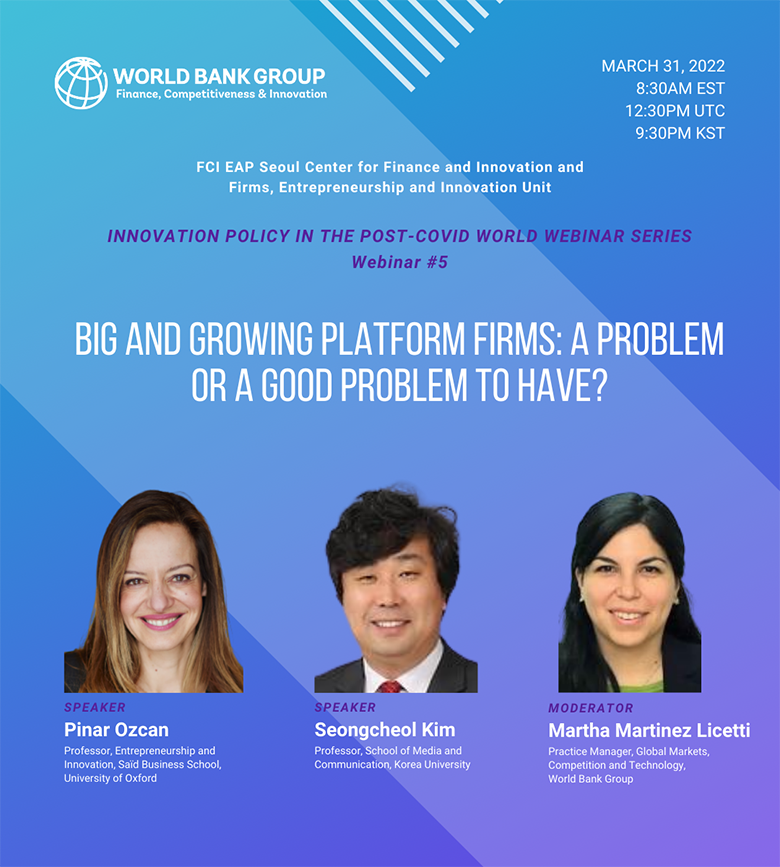
The proliferation of digital and data intensive sectors presents growth opportunities in emerging economies. Better use of data permits firms to improve productivity and the quality of their products, increase efficiency, lower prices, and develop new innovative products and services that can bring significant benefits to consumers. But these opportunities also entail potential risks: How to ensure a level playing field in digital markets where a small number of firms wield strong market power? What is the value of developing local platforms versus leveraging the services of global ones? More importantly, how can platforms be leveraged to spur local digital ecosystems and innovation in emerging economies? These questions have become even more prevalent in the post-pandemic world where digital platform firms have gained even more considerable market power and amassed large sums of data.
The European Commission had tabled no less than three new acts with the goal of regulating its digital markets. The U.S. has proposed legislation, both in the House of Representatives and Senate. In Korea, one of the main online platforms have become the mainstream of the consumer market and the topic of new legislations. All efforts want to curb the power of a small number of companies, mainly US firms, as they are the global market dominants. These legislative efforts come at a time when there is already a live debate within many emerging economies, amplified by the ongoing COVID crisis, about the role of digital platforms in the economy and society, its impact on competitiveness, inclusion and trade.
The objective of this webinar is to discuss the scaling of digital platforms and big data firms, global trends in platform dominance, and implications for emerging economies and countries with platform gaps. The discussion will draw on global experiences and highlight Korea’s experience as a case of platform battlefield between incumbent platforms and global ones.
Link to recording: Innovation Policy in the Post-COVID World Webinar Series: Big and Growing Platform Firms - A Problem or a Good Problem to Have?
Related Links:
- International Energy Agency’s Energy Efficiency 2021 Report
- Transforming Industry: Paths to Industrial Decarbonization in the United States
- Explaining the contract terms of energy performance contracting in China: The importance of effective financing
- Implied discount rate and payback threshold of energy efficiency investment in the industrial sector
- Energy Prices and the Adoption of Energy-Saving Technology
- Climate Competitive Industries: A Practitioner’s Handbook
-
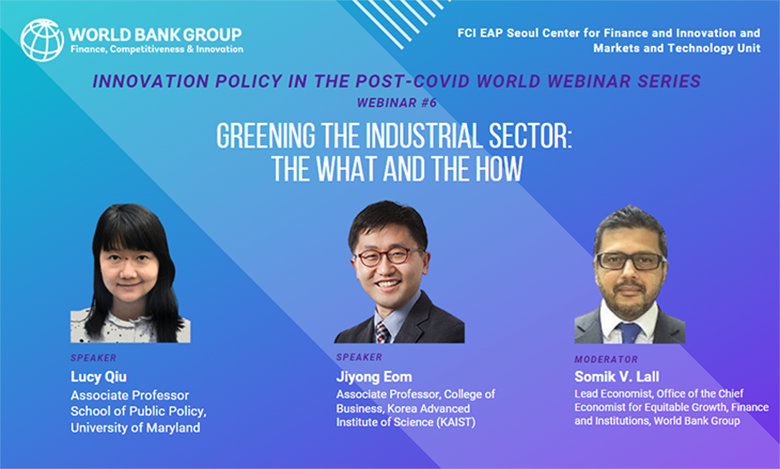
The International Energy Agency (IEA) considers energy efficiency to be the ‘first fuel’ as it is ‘still the cleanest and cheapest way to meet our energy needs’. Innovation in better and more energy efficient green technology has paved the way for driving down energy costs as well as the reliance on energy itself. More efficient energy systems and processes for energy and carbon intensive industries have emerged but yet to be widely deployed, especially in emerging economies. Digital solutions for monitoring and reducing consumption have enabled users to monitor consumption and reduce consumption. However, the adoption of such technologies has not necessarily followed swiftly despite government initiatives and incentives. Why? What’s the inducement effects of energy pricing on adoption of greener and more efficient technologies in the industrial sector?
In Korea, a major energy consumer, the high reliance on imported fuel has been the motivation for Korea’s longstanding policies on improving energy efficiency and minimize energy consumption. While the contribution of the manufacturing sector toward GDP was maintained at about 25%, its proportion of CO2 emissions was smaller and has decreased over time. Korea’s manufacturing sector exhibited some of the highest carbon intensity levels in the world in 2005, it has sharply reduced carbon intensity from 0.311 to 0.192. Korea’s most recent Green New Deal includes initiatives on smart green industrial complexes – how effective are these comprehensive strategies and what role do they play in signaling to the market?
The COVID-19 pandemic has exposed the vulnerability of the global economy to external shocks and renewed interest in the green agenda to mitigate and adapt the private sector to climate shocks. The objective of this webinar is to better understand the dynamics of energy efficiency technology adoption in the industrial sector and the effectiveness of the policy instruments and strategies in achieve it. The discussion will address questions such as: what does “greening” the industrial sector means in practice and how to achieve it? What has been the evidence on the efficacy of policies targeting adoption of EE solutions? Would a horizontal or a more sector-specific approach targeting more polluting sectors lead to greater emission reduction? What policy experiences are most relevant and replicable in emerging country context?
Link to recording: Innovation Policy in the Post-COVID World Webinar Series: Greening The Industrial Sector - The What and The How
Related readings:
- International Energy Agency’s Energy Efficiency 2021 Report
- Transforming Industry: Paths to Industrial Decarbonization in the United States
- Explaining the contract terms of energy performance contracting in China: The importance of effective financing
- Implied discount rate and payback threshold of energy efficiency investment in the industrial sector
-

For most of its history, the semiconductor industry has successfully operated globally and was featured heavily in global value chains. Today, it is the industry norm that no one country or company can fully or independently produce or assemble semiconductor components. However, over the past two years, the global pandemic has significantly stress tested this globally oriented and interdependent value chain. The unanticipated and unprecedented spike in demand for chip-enabled products has created semiconductor supply shortages that have disrupted the operation of many downstream sectors dependent on chips. This, in combination with geopolitical tensions, is putting the sector at the center of industrial policies in advanced economies. The newly passed semiconductor bill in the US and the European Chips Act are aiming to reorient this value chain towards re-shoring and reshuffling the existing division of labor in the sector.
Given these unprecedented short-term market disruptions and the costs associated with the move to complete autarky, it remains to be seen whether the chip industry will remain heavily globally interdependent in the long-term. In addition, the semiconductor market is estimated to grow significantly over the next 10 years, as chips become more important to the global and more digitized economy. With this backdrop and the enduring importance of semiconductors in production chains, is there an opening for developing economies to participate in the global semiconductor value chain? What innovation policies are most conducive for this purpose, such as workforce development, intellectual property regimes, trade facilitation and FDI attraction? On the consumption side, how could developing countries encourage chip-enabled technologies, such as 5G that help connect and enable economies through improved digital infrastructure? Do these disruptive trends offer opportunities for catching up economies to upgrade their technological capabilities or widen the existing technological divide? What do companies like Qualcomm and SK hynix look for in a country or region when making decisions on production investments?
Link to recording: Circuits Shortened or Supercharged? Emerging Dynamics in the Semiconductor Industry and Implications for Developing Economies
Related readings:
-
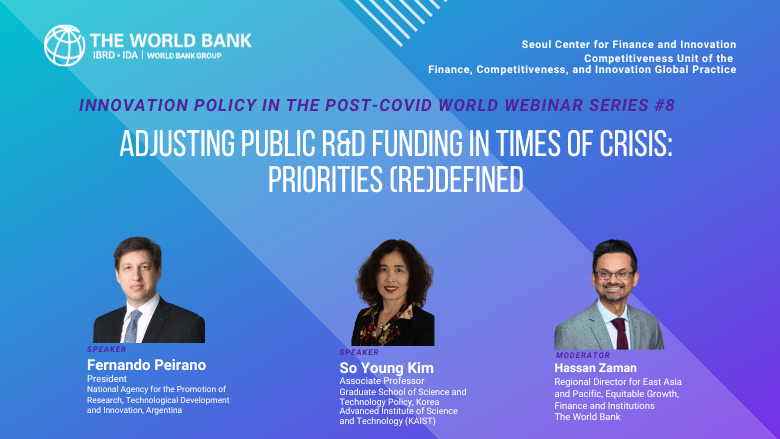
Public support to the R&D agenda is driven by societal needs, contributing to expansion of knowledge frontiers, improving social welfare, economic growth, and protection of the environment. Economies are also becoming more reliant on research and technology to respond to these needs. In response to the grand societal challenges such as global pandemics, climate change and the green transition, countries have expanded public research expenditures, with the members of the OECD doubling their budgetary allocations for R&D across 15 years from 2005 to 2020, reaching $498 billion.
In times of crisis, policymakers are faced with the challenge of defending and recalibrating the research agenda, in terms of orientation towards present and future needs. In the past, East Asian economies leveraged research for economic catch-up, prioritizing economic growth and promoting applied research through industrial policies. As a result, Korea’s proportion of public R&D budget for basic research remains lower than that of other Western Economies. However, public funding portfolios tilted toward basic research do introduce challenges related to realizing the economic outcomes of research investments, especially if private investments in applied and experimental R&D decrease due to uncertainty or a potential recession.
Considering the shake-up of societal priorities caused by the pandemic and the mounting environmental challenges, how is the research agenda evolving to respond to current and future needs? How are the priorities defined and redefined to go beyond market, economic, and developmental legacies (or could they)? How can the drive towards techno-nationalism/sovereignty reconcile with the principles of open innovation and international research collaboration? What does the recent policy experience from Korea and Argentina tell us? And what are the implications to catching-up economies?
Related readings
-
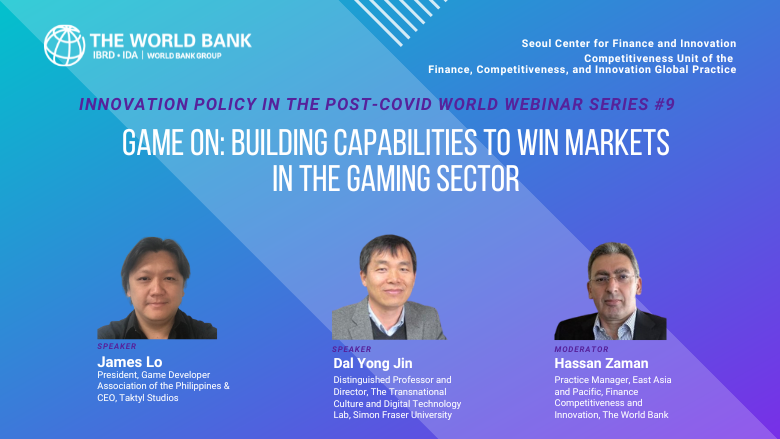
Recording available here.
The pandemic has accelerated the shift of economic activity to digital platforms with revenue in the gaming industry increasing by 32 percent between 2019 and 2021. Benefiting from expanded connectivity, the industry developed a complex set of production and publishing linkages allowing major gaming firms to draw from the global talent pool, opening new opportunities for first-time developers and firms. Emerging economies with a considerable gaming population and abundant digitally skilled labor, such as the Philippines, have been able to participate in the global value chain of game development through the outsourcing business model. Korea, home of avid gamers and globally successful games, has been grooming its industry for additional growth and positive spillovers through regulation, entrepreneurship policy, workforce development, and content creation support.
The gaming industry holds potential for growth in emerging economies and a significant impact on South-South trade, as noted by a recent UNCTAD report on the creative industry. Given the dynamism the industry experienced during the pandemic, does the industry genuinely hold promise, or is the outlook rose-tinted by COVID-related trends? What can we learn from the experiences of Korea and the Philippines in promoting the gaming sector and enhancing spillovers? What are the barriers to entry, growth, and skills development, and how can innovation policies help enhance spillovers? What are the resources and conditions that can facilitate the upgrade of the gaming industry from basic outsourcing to original content creation?
Related readings:
- United Nations Conference on Trade and Development (UNCTAD (2022) Creative Economy Outlook 2022
- United Nations Educational, Scientific and Cultural Organization (UNESCO (2021) Cultural and creative industries in the face of COVID-19
- World Bank (2020) Philippines Digital Economy Report 2020
- Korea Creative Content Agency (2023) 2022 White Paper on Korean Games
James Lo is the President and a founding member of the Game Developers Association of the Philippines. James has been with the association for over 16 years, during which time he has supported development and creation of a wide variety of interactive games and entertainment content for a wide range of platforms, as well as serving as a representative for the organization. He is also CEO of Taktyl Studios and serves as a board member of the Philippines chapter of the International Game Developers Association.
Dal Yong Jin is a Distinguished Professor at the Communications School of Simon Fraser University. Jin’s major research and teaching interests are on digital platforms and digital games, globalization and media, transnational cultural studies, and the political economy of media and culture. He has been directing The Transnational Culture and Digital Technology Lab since the summer of 2021. Since May 2022, Jin is fellow of the International Communication Association (ICA). Jin holds a PhD in Communications from University of Illinois at Urbana-Champaign and an MPA from University of Texas at Austin. His publications include Korea’s Online Gaming Empire, New Korean Wave: Transnational Cultural Power in the Age of Social Media, and The Political Economy of the Digital Game Industry (forthcoming).
Moderator
Zafer Mustafaoglu is the Practice Manager for FCI in the East Asia and Pacific region. Previously, he was the Practice Manager for FCI in the Latin America region and Lead Economist / Program Leader for Argentina, Paraguay, and Uruguay. His expertise is in macro and micro policy areas including economic growth and productivity, innovation, financial inclusion, development banks, infrastructure finance, trade integration, SME support and enterprise development, foreign exchange rates, and debt sustainability. Prior to the World Bank, he worked twelve years for the Turkish Government including the Prime Ministry State Planning Organization of Turkey. Zafer holds a PhD in International Economics from the Middle East Technical University and a Masters in Economics from the University of Essex.
Events Detail
- Date and Time: March 8, 2023, 9:00 PM EST / March 9, 2023, 11:00 AM KST